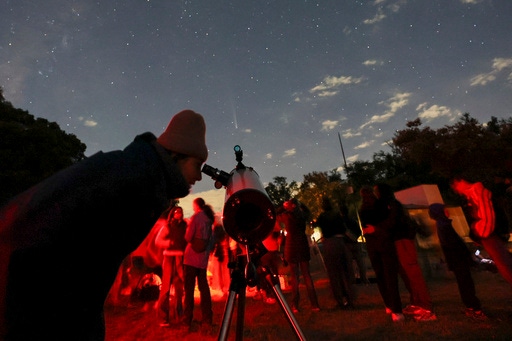Stargazers’ delight: Efforts to cut unwanted light pollution in New Mexico win praise

FILE -People attend a stargazing and comet-watching gathering at Joya-La Barreta ecological park in Queretaro, Mexico, Saturday, Oct. 19, 2024. (AP Photo/Ginnette Riquelme, File)[ASSOCIATED PRESS/Ginnette Riquelme]
SANTA FE, N.M. (AP) — Advocates for limits on indiscriminate outdoor lighting that obscures night skies worldwide are recognizing efforts by an oil and natural gas developer to reduce scattered light in New Mexico.
DarkSky International, an advocacy group for preserving or restoring views of starry skies, announced on Wednesday its first-ever certification of oil and natural gas sites that seek to reduce unwanted light pollution.
It recognized Denver-based Franklin Mountain Energy for lighting retrofits at two sites and one new location within a major oil production zone in southeastern New Mexico. The projects are expected to reduce skyglow at locations including Carlsbad Caverns National Park, a remote gathering point for astronomy buffs and night hiking.
“It doesn’t do anything to impact their bottom line — it actually makes the workplace safer,” said Peter Lipscomb, vice chair of the New Mexico chapter of DarkSky International, because sensible lighting reduces direct glare that otherwise can make it harder for workers to see.
“Being rewarded by (seeing) the dark skies of our ancestors, all those things together, it’s a winning combination.”
Franklin Mountain Energy cofounder Audrey Robertson said the lighting changes reduce electricity consumption. The company said in a statement that it worked on the effort with an alliance of federal land and parks agencies, telescopic observatories and the New Mexico Oil and Gas Association. Recommendations from the alliance include equipment that directs light downward onto work areas and limits light that is cast upward into the sky.
Stargazers worldwide are grappling with the encroachment of outdoor lighting at night.
A 2023 study that analyzed data from more than 50,000 amateur stargazers found that artificial lighting is making the night sky across the world about 10% brighter each year. As of 2016, more than 80% of the world lived under light-polluted skies that obscure the Milky Way.
New Mexico state lawmakers are drafting a proposed update to a 1999 law that regulates outdoor night lighting in the state’s high-altitude mountains and desert. The initiative responds to a rapid increase in light pollution amid advances in energy-efficient LED technology that has spurred more outdoor night lighting that is often unshielded.
The National Park Service has set the protection of dark night skies as a priority at remote locations including the Chaco Culture National Historic Park, an area of New Mexico that Native Americans consider sacred. More than 99% of the park has no permanent outdoor lighting.
Lipscomb also credited oil operators in West Texas that are embracing changes to protect starry skies in collaboration with the McDonald Observatory, near Fort Davis, where research and education depends on dark nights.
Copyright 2025 The Associated Press. All rights reserved. This material may not be published, broadcast, rewritten or redistributed without permission.
